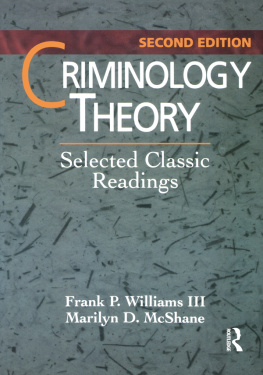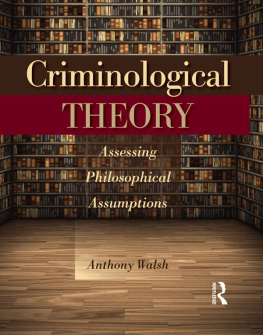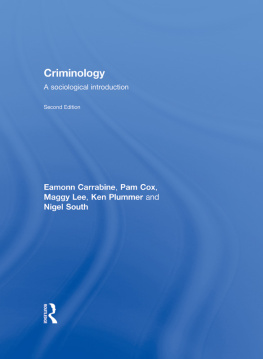
MECHANISTIC CRIMINOLOGY
The science of criminology is at a crossroads. Despite accumulating a dizzying array of facts about crime, the field has yet to identify a body of theories that allows for the adequate prediction, explanation, and control of phenomena of central interest to criminologists. Mechanistic Criminology locates this problem within the fields failure to conform to the expectations of scientific fields and reliance on antiquated methods of theory construction. The authors contend that this failure has resulted in an inability of criminologists to engage in theory falsification and competitiontwo central activities of sciencethat produce the forms of reliable knowledge that are unique to scientific fields.
Mechanistic Criminology advocates for the adoption of a mechanistic mode of theorizing to allow criminologists to engage in theory falsification and competition and ignite rapid scientific discovery in the field. The proposed method is the same one employed within the biological sciences, which is responsible for their rapid scientific progress in the late twentieth and early twenty-first centuries. Should criminologists adopt this mechanistic approach, criminology could experience the same scientific revolution that is occurring in the biological sciences, and criminologists would generate the knowledge necessary for the prediction, explanation, and control of crime.
K. Ryan Proctor is Associate Professor of Sociology and Criminology at Avila University. His current research focuses on the development and application of theoretical methods to promote scientific progress within the social sciences, as well as understanding how technological advances alter social structures in ways that facilitate or inhibit crime.
Richard E. Niemeyer is a co-founder and former Deputy Director of the Institute for the Applications of Mathematics and Integrated Science at the University of California, Riverside. His research broadly focuses on increasing systemicity between mathematics, the life sciences, and the social sciences. He currently lives in Denver, Colorado.
EVOLUTIONARY ANALYSIS IN THE SOCIAL SCIENCES
A series edited by Jonathan H. Turner and Kevin J. McCaffree
This new series is devoted to capturing the full range of scholarship and debate over how best to conduct evolutionary analyses on human behavior, interaction, and social organization. The series will range across social science disciplines and offer new cutting-edge theorizing in sociobiology, evolutionary psychology, stage-modeling, co-evolution, cliodynamics, and evolutionary biology.
Published
MECHANISTIC CRIMINOLOGY
K. Ryan Proctor and Richard E. Niemeyer (2019)
THE NEW EVOLUTIONARY SOCIOLOGY
New and Revitalized Theoretical Approaches
Jonathan H. Turner and Richard S. Machalek (2018)
THE EMERGENCE AND EVOLUTION OF RELIGION BY MEANS OF NATURAL SELECTION
Jonathan H. Turner, Alexandra Maryanski, Anders Klostergaard Petersen, and Armin W. Geertz (2017)
Forthcoming
THE EVOLUTION OF WORLD SYSTEMS
Christopher Chase-Dunn
WHY GROUPS COME APART
Fusion-Fission Dynamics in Human Societies
Kevin McCaffree
MAPS OF MICROHISTORY
Models of the Long Run
Martin Hewson
MECHANISTIC
CRIMINOLOGY
K. Ryan Proctor and Richard E. Niemeyer
First published 2019
by Routledge
52 Vanderbilt Avenue, 11th Floor, New York, NY 10017
and by Routledge
2 Park Square, Milton Park, Abingdon, Oxon, OX14 4RN
Routledge is an imprint of the Taylor & Francis Group, an informa business
2019 Taylor & Francis
The right of K. Ryan Proctor and Richard E. Niemeyer to be identified as authors of this work has been asserted by them in accordance with sections 77 and 78 of the Copyright, Designs and Patents Act 1988.
All rights reserved. No part of this book may be reprinted or reproduced or utilised in any form or by any electronic, mechanical, or other means, now known or hereafter invented, including photocopying and recording, or in any information storage or retrieval system, without permission in writing from the publishers.
Trademark notice : Product or corporate names may be trademarks or registered trademarks, and are used only for identification and explanation without intent to infringe.
Library of Congress Cataloging-in-Publication Data
Names: Proctor, K. Ryan, author. | Niemeyer, Richard E., author.
Title: Mechanistic criminology / by K. Ryan Proctor, Richard E. Niemeyer.
Description: 1 Edition. | New York : Routledge, 2019. | Series: Evolutionary analysis in the social sciences | Includes bibliographical references and indexes.
Identifiers: LCCN 2018060673| ISBN 9781138342552 (hbk) | ISBN 9781138342569 (pbk) | ISBN 9780429262791 (eISBN)
Subjects: LCSH: CriminologyMethodology.
Classification: LCC HV6018 .P765 2019 | DDC 364dc23
LC record available at https://lccn.loc.gov/2018060673
ISBN: 978-1-138-34255-2 (hbk)
ISBN: 978-1-138-34256-9 (pbk)
ISBN: 978-0-429-26279-1 (ebk)
Typeset in Bembo
by Swales & Willis Ltd, Exeter, Devon, UK
This book represents the development of many years of thinking about how to improve the scientific enterprise within criminology. We fully acknowledge that we are not the first to attempt to improve scientific rigor within the field. Criminologys history is one of countless individuals who have diligently worked, persisted, and offered invaluable insights in the ongoing effort to establish, maintain, and further develop a scientific criminology. We also acknowledge that the theoretical method we propose in this book will inevitably fall short of its aims and our ambitions, as science is inevitably a collective endeavor and not an individual one. Nonetheless, like many other criminologists, we believe science gives criminology the best hope for predicting, explaining, and controlling the social phenomenon of crime.
Just as science is a collective endeavor, so too is the authoring of a book. Both authors owe a tremendous debt to those professors who significantly contributed to their intellectual development while earning doctorate degrees in sociology from the University of California, Riverside (UCR). Peter J. Burke greatly influenced both authors throughout our graduate training by introducing us to theoretical methods and formalism. For Richard E. Niemeyer, who also earned his bachelors degree at UCR, Peter significantly influenced Richards career trajectory by inspiring him to become a sociologist. Contrary to Peter J. Burkes theoretical approach, which emphasizes the use of scope and boundary conditions when constructing theory, Jonathan H. Turner also profoundly influenced both authors growth as social scientists. Jonathan H. Turners emphasis on general theory and theory integration between various scientific fields inspired both authors to look beyond the narrow confines of sociological thought when attempting to explain social phenomena. Jonathan H. Turner served on both authors dissertation committees, and strongly influenced Ryans ideas on theoretical formalism. He also strongly encouraged and nurtured Richards passion for theory and penchant for ignoring disciplinary boundaries. Richard would also like to thank his friend and colleague, David Franks, for introducing him to the field of neurosociology, and for all of Davids stories about model airplanes and his days as an amateur boxer.






